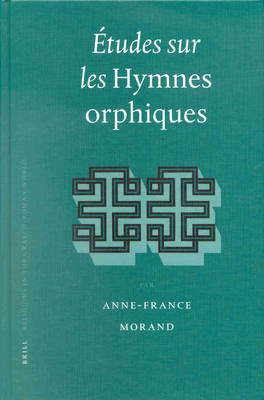
- Afhalen na 1 uur in een winkel met voorraad
- Gratis thuislevering in België vanaf € 30
- Ruim aanbod met 7 miljoen producten
- Afhalen na 1 uur in een winkel met voorraad
- Gratis thuislevering in België vanaf € 30
- Ruim aanbod met 7 miljoen producten
Zoeken
Omschrijving
The book is a study of the Orphic Hymns, a collection of 87 Greek texts in hexameter addressed to various deities. These hymns are closely related to one another and seem to originate in Asia Minor during the first centuries of the Christian era. The great originality of this corpus is that a link can be traced between a set of beliefs, rituals, offerings and mysteries, and a group of believers. Surprisingly the Hymns has been generally neglected.
Les études sur les Hymnes orphiques begins with a study of the genre. The Hymns are essentially composed of long lists of epithets and are therefore distinctive. Through the choice of epithets in the different hymns and a comparision between the different texts it is possible to trace allusions to myths, to rituals and to mysteries related to the gods. This first part also concentrates on the literary ways of expressing religious ideas. The group using this text referred to the legendary figure Orpheus as the composer of the Hymns. It is therefore not surprising to find Dionysos at the center of this text. The basic approach is to compare the content of the Hymns to what we know and do not know about orphism. Questions such as vegetarianism, prohibition of beans, belief in metempsychosis, the content of the mysteries arise. It may seem awkward to find typically orphic gods, such as Protogonos, next to traditional gods and local deities from Asia Minor. Finally, the group was organised and the participants bore titles such as boukolos, the oxherd. A large place is given to epigraphy. The aim is to fit these elements to a definition of orphism during the first centuries of our era and to put together an image of this particular group.
This book will be essential to scholars interested in orphism, in Greek religion, in religion at the beginning of Christianity, in literature and in hymns.
Les études sur les Hymnes orphiques begins with a study of the genre. The Hymns are essentially composed of long lists of epithets and are therefore distinctive. Through the choice of epithets in the different hymns and a comparision between the different texts it is possible to trace allusions to myths, to rituals and to mysteries related to the gods. This first part also concentrates on the literary ways of expressing religious ideas. The group using this text referred to the legendary figure Orpheus as the composer of the Hymns. It is therefore not surprising to find Dionysos at the center of this text. The basic approach is to compare the content of the Hymns to what we know and do not know about orphism. Questions such as vegetarianism, prohibition of beans, belief in metempsychosis, the content of the mysteries arise. It may seem awkward to find typically orphic gods, such as Protogonos, next to traditional gods and local deities from Asia Minor. Finally, the group was organised and the participants bore titles such as boukolos, the oxherd. A large place is given to epigraphy. The aim is to fit these elements to a definition of orphism during the first centuries of our era and to put together an image of this particular group.
This book will be essential to scholars interested in orphism, in Greek religion, in religion at the beginning of Christianity, in literature and in hymns.
Specificaties
Betrokkenen
- Auteur(s):
- Uitgeverij:
Inhoud
- Aantal bladzijden:
- 392
- Taal:
- Frans
- Reeks:
- Reeksnummer:
- nr. 143
Eigenschappen
- Productcode (EAN):
- 9789004120303
- Verschijningsdatum:
- 31/10/2001
- Uitvoering:
- Hardcover
- Formaat:
- Genaaid
- Afmetingen:
- 162 mm x 243 mm
- Gewicht:
- 825 g

Alleen bij Standaard Boekhandel
+ 705 punten op je klantenkaart van Standaard Boekhandel
Beoordelingen
We publiceren alleen reviews die voldoen aan de voorwaarden voor reviews. Bekijk onze voorwaarden voor reviews.








